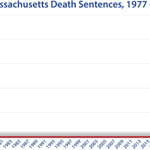
State & Federal
Massachusetts

History of the Death Penalty
Massachusetts was one of the first states to carry out the death penalty in colonial times but has since changed its approach. In early times, hanging was the primary method of execution. Some defendants in the 1600’s were executed for religious affiliations. Mary Dyer was just one of the people executed for affiliating with the Quaker religion and there were dozens of individuals, both male and female, executed for witchcraft. In 1900, Massachusetts installed an electric chair to be used in death penalty cases. Electrocution was the most common form of execution in the Commonwealth until capital punishment was abolished in 1984. After the death penalty was ruled unconstitutional in the state, governors, including Mitt Romney, have tried to reinstate the death penalty. Attempts thus far have been unsuccessful.
Famous Cases
John Billington, a colonist who arrived on the Mayflower, was the first person executed in Massachusetts, in 1630. He was hung for killing John Newcomen.
On April 15, 1920, two men, Frederick Parmenter and Alessandro Berardelli, were robbed and murdered in Braintree, Massachusetts. The two men charged with the murder, Ferdinando Nicola Sacco and Bartolomeo Vanzetti, were Italian immigrants and followers of Luigi Galleani, an Italian anarchist. Before Sacco and Vanzetti were tried for the murders, Vanzetti was tried and convicted of a separate robbery, despite the testimony of 16 witnesses who provided an alibi for him. Heavy security was put in place for the murder trial, due to fears that other anarchists might try to bomb the courthouse. The prosecution presented evidence that one of the four bullets retrieved from Berardelli’s body matched a gun owned by Sacco, though witnesses testified that they saw one man shoot Berardelli four times, suggesting that all four bullets should have come from the same gun. Defense witnesses testified that they were having lunch with Sacco at the time of the robbery and murder, and others said that Vanzetti had been selling fish at that time. When Sacco and Vanzetti were convicted of first-degree murder, a capital crime, demonstrations were held in cities throughout Italy and Latin America. Supporters believed that the men had been convicted because of their anarchist beliefs.
In 1925, Celestino Madeiros, an ex-convict awaiting trial for a different murder, confessed to committing the Braintree murders. Lawyers for Sacco and Vanzetti presented an appeal to Massachusetts’ highest court, the Supreme Judicial Court, but it was denied. In denying the appeal, the court said, “It is not imperative that a new trial be granted even though the evidence is newly discovered and, if presented to a jury, would justify a different verdict.” In 1927, after the appeal had been denied, Judge Webster Thayer sentenced the two men to death. The governor denied clemency after a commission he had formed declared that the trial had been fair. Madeiros (who had been convicted of a separate murder), Sacco, and Vanzetti were all executed on August 23, 1927. The following day, protesters demonstrated around the world. Over 10,000 people in Boston viewed Sacco and Vanzetti in open caskets over two days. Fifty years later, then-Governor Michael Dukakis declared August 23, 1977 Nicola Sacco and Bartolomeo Vanzetti Memorial Day.
The last executions to take place in Massachusetts were Phillip Bellino and Edward Gertson on May 9, 1947 for the murder of Robert William. Both defendants were electrocuted at Charlestown State Prison. Their executions inspired a commission to evaluate the death penalty in Massachusetts to determine the effectiveness.
Milestones in Abolition/Reinstatement
After Furman v. Georgia, voters in the Commonwealth passed an amendment that allowed the death penalty in 1982. Under this new amendment, the state could not “be construed as prohibiting the imposition of the punishment of death”. Later that same year, the legislature passed a bill reinstating the death penalty for first-degree murder.
In Commonwealth v. Colon-Cruz (1984), the Massachusetts law that enabled capital punishment was ruled unconstitutional on the grounds that it was not applied fairly, since only defendants who went to trial were eligible; this excluded defendants who plead guilty.
Other Interesting Facts
Until 1951, any first degree murder conviction required the death penalty. This changed to provide jury discretion on most murder cases. However, the death penalty was still mandated in murders involving rape or attempted rape.
In total, there have been 345 executions in Massachusetts, including 26 for witchcraft. Nineteen of those executed for witchcraft were hanged in Salem in 1692 as a result of the infamous Salem Witch Trials.
Resources

News & Developments
News
Apr 10, 2025
A Retreat from the Harshest Punishments for Emerging Adult Defendants
To commemorate the 20th anniversary of the United States Supreme Court decision that ended the juvenile death penalty, DPI will release a report examining the legacy of this decision and its implications for emerging adults. This article examines one area of focus in the report: recent state courts decisions that have extended legal protections to emerging adults ages 18 to 20. In 2012, in Miller v. Alabama, the U.S. Supreme Court emphasized that“youth matters”…
Read MoreNews
Mar 27, 2024
Federal Appellate Court Ruling Requires Investigation into Jury Bias in Boston Marathon Case
On March 21, 2024, the 1st U.S. Circuit Court of Appeals ordered the judge who presided over Dzhokhar Tsarnaev’s (pictured) trial to investigate his defense attorneys’ claims of juror bias and determine whether Mr. Tsarnaev’s death sentence should be overturned because of this bias. In a 2 – 1 decision, the 1st Circuit declined defense attorney requests to overturn Mr. Tsarnaev’s death sentence for his participation in the April 2013 Boston Marathon bombing but found that the…
Read MoreNews
Aug 01, 2022
Massachusetts Formally Exonerates Last ‘Witch’ Wrongfully Condemned During Salem Hysteria. Will Connecticut Follow Suit?
As Massachusetts formally exonerated the last person condemned for witchcraft in the colony, efforts are under way to clear the names of the 46 people wrongfully charged with witchcraft in neighboring Connecticut during the 17th century…
Read MoreNews
Oct 14, 2021
Supreme Court Hears Argument on Department of Justice Efforts to Reinstate Death Penalty in Boston Marathon Bombing Case
A United States Supreme Court sharply divided along ideological lines heard oral argument October 13, 2021 on the Department of Justice’s appeal of a federal circuit court’s ruling overturning the death sentences imposed on Dzhokhar Tsarnaev for his convictions in the 2013 Boston Marathon bombing. Veteran court watchers reported that the six conservative justices seemed poised to overturn the federal appeal court’s grant of a new…
Read MoreNews
Sep 01, 2021
Massachusetts 8th Graders Push to Exonerate Woman Sentenced to Death in 1693 in Salem Witchcraft Hysteria
A group of 8th graders from North Andover Middle School in North Andover, Massachusetts are championing efforts to posthumously pardon a young woman who was sentenced to death for witchcraft in 1693 during the height of the Salem witchcraft…
Read More

